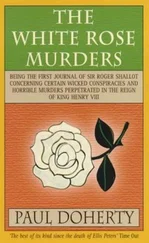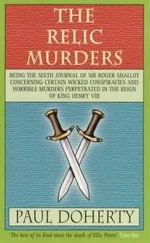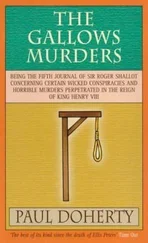Paul Doherty - The Waxman Murders
Здесь есть возможность читать онлайн «Paul Doherty - The Waxman Murders» весь текст электронной книги совершенно бесплатно (целиком полную версию без сокращений). В некоторых случаях можно слушать аудио, скачать через торрент в формате fb2 и присутствует краткое содержание. Год выпуска: 0101, Жанр: Исторический детектив, на английском языке. Описание произведения, (предисловие) а так же отзывы посетителей доступны на портале библиотеки ЛибКат.
- Название:The Waxman Murders
- Автор:
- Жанр:
- Год:0101
- ISBN:нет данных
- Рейтинг книги:3 / 5. Голосов: 1
-
Избранное:Добавить в избранное
- Отзывы:
-
Ваша оценка:
- 60
- 1
- 2
- 3
- 4
- 5
The Waxman Murders: краткое содержание, описание и аннотация
Предлагаем к чтению аннотацию, описание, краткое содержание или предисловие (зависит от того, что написал сам автор книги «The Waxman Murders»). Если вы не нашли необходимую информацию о книге — напишите в комментариях, мы постараемся отыскать её.
The Waxman Murders — читать онлайн бесплатно полную книгу (весь текст) целиком
Ниже представлен текст книги, разбитый по страницам. Система сохранения места последней прочитанной страницы, позволяет с удобством читать онлайн бесплатно книгу «The Waxman Murders», без необходимости каждый раз заново искать на чём Вы остановились. Поставьте закладку, и сможете в любой момент перейти на страницу, на которой закончили чтение.
Интервал:
Закладка:
They made their way across the frost-encrusted common, the breeze biting at their faces, nipping their noses, cheeks and ears. Corbett pulled his cloak up. When they reached Sweetmead, the guards lounging around in the porches and recesses rose to greet them. They assured Corbett that no one had left the manor, though he was not too certain about how strict their watch had become. Lady Adelicia certainly looked as if she had not left the house. A furred nightrobe around her shoulders, bare feet pushed into buskins, her hair undressed, she met them in the small parlour and rose to greet them coldly. She apologised for the weak fire and complained bitterly about Berengaria, how she was supposed to be here to tend to her.
‘Madam,’ Corbett caught her sleeve, ‘I bring you sad news.’ He told her exactly what had happened at St Alphege’s, how Berengaria had been garrotted. Lady Adelicia heard him out coldly, nodding now and again, lifting her hand, fluttering her fingers, the only sign of any emotion.
‘Lady Adelicia,’ Corbett continued, ‘I must be blunt with you. We have discovered that when you met Wendover in The Chequer of Hope, Berengaria did not go to the stalls or shops but hurried back to Sweetmead. I believe she — how can I put it — did certain services for your husband.’
Lady Adelicia sat propped in the chair, her face towards the weak fire. ‘Berengaria was like a cat in an alleyway.’ She didn’t even turn her head, but talked as if whispering to herself. ‘She lived on her wits, with a keen eye for mischief. I realised Sir Rauf knew about myself and Wendover but that he didn’t really care! I guessed it must be Berengaria: when we did go to the markets, she seemed to have more money than she should. Now she’s dead. Why, Sir Hugh?’
Corbett shrugged. ‘Mistress, before I continue, do you know the whereabouts of Lechlade?’
She pointed to the ceiling. ‘Sprawled upstairs drunk, I suppose, as he always is.’
Corbett excused himself, told Ranulf to stay with Lady Adelicia and walked out into the passageway and up the stairs. He passed the gallery where Lady Adelicia and Sir Rauf’s chambers stood, and went up further into a small stairwell. The door to the facing room was off the latch; he pushed it open. Lechlade’s garret was nothing more than a sty, dirty and dishevelled, with hardly any furniture. Lechlade sprawled on a pallet bed in the far corner, snoring like a pig, one hand grasping a tankard. Corbett looked distastefully round: dirty clothes were piled in the corner, a broken knife, a pair of tattered boots, some crusted pots and a cracked jug littered the floor. He walked quietly towards the bed and stared down. The bolster was stained, the sheets dirty and grimy, the blanket Lechlade had wrapped about himself holed and moth-eaten. He left and rejoined Lady Adelicia and Ranulf in the parlour.
‘Lady Adelicia,’ Corbett declared, ‘I must warn you, your life too may be in danger.’
She looked up, startled. ‘Me?’ she said. ‘Why should anyone wish to kill me?’
‘Perhaps they have already tried,’ Corbett replied, pulling the stool closer, staring into the hard eyes of this young woman. ‘Lady Adelicia, you did not kill your husband, and yet somebody stained your cloak with blood either at The Chequer of Hope or when you arrived home. Somebody else put those bloody napkins in your chamber. How? I don’t know. For what reason?’ He watched the colour drain from her face. ‘Oh yes, somebody wanted to dispatch you to either the stake or the noose. They certainly wanted you out of this house. Why is that, Lady Adelicia? To search for something?’ Now he had her attention. Corbett stretched out his hand and brushed hers; it felt cold as ice. ‘Lady Adelicia, you must realise your life is in great danger, not because of Wendover or anything else but because of what you know, or might know, or might have found. You told me about seeing your husband at the dead of night, dragging what you thought was a corpse from this house, to bury in the garden beyond?’
She nodded.
‘But there again, I’ve been in that garden; it is all tangled and overgrown. And it would have been dark when your husband brought that corpse out. How did you know what he was dragging? And if your husband, whom you hated so much, had committed such a foul act, I wager, Lady Adelicia, you would have certainly used that against him. Surely you must have been curious? You could have gone out to that part of the garden when your husband was distracted, and discovered what was truly buried there. Instead, you tell me some fable that by mere chance you are standing by your window in the dead of night and you see your husband dragging out a corpse. You even know where he buried it. Lady Adelicia,’ Corbett’s voice rose sharply, ‘I am no fool. This mummery must stop! I want the truth.’
Ranulf, leaning against the doorpost, arms folded, smiled falsely at her. ‘We could, master, take Lady Adelicia to London. A stay in a Tower dungeon, the Fleet or Newgate might loosen her tongue.’
‘Don’t threaten me!’ she snapped. ‘Neither of you knows what it’s like to be a woman alone in a world of men.’
‘Then tell us,’ Ranulf said. ‘Otherwise, mistress, you will be depicted as a murderess, or who knows, whoever killed Berengaria might creep in here. They are searching for something. What?’
Lady Adelicia drew herself up, hitching her robe closer about her shoulders. ‘About eighteen months ago, on the Feast of St John the Baptist, I was here in the parlour. Sir Rauf, as usual, was locked in his chancery chamber, counting his wealth. There was a knock on the door. Lechlade had done his duties, but the sun was setting. You’ve seen Lechlade? Like a pig in its sty or a dog returning to his vomit, he was in some ale-drenched sleep. I went out and opened the door. A man stood there. I didn’t like him. He was cloaked, though I could glimpse the stained jerkin beneath, and his boots were scuffed. He had a lean face, a slight cast in one eye. I was about to drive him away as one of those noisome beggars when he demanded to see Sir Rauf. “Tell him Stonecrop is here.” I did so. My husband came quickly enough when I told him the reason. He swiftly ushered Stonecrop into his chamber. I was intrigued, curious. My husband had had visitors before in the dead of night, but there was something about Stonecrop and the way Sir Rauf was so eager to see him, so I decided to eavesdrop, as I often did. I put on a pair of soft buskins and listened very carefully. Sometimes Sir Rauf could not be heard, but this time voices were raised. To get to the point, Sir Hugh: Stonecrop was a sailor; he’d apparently been on The Waxman when it had been captured. He had been flung overboard, swum ashore and taken refuge. Afterwards, he was forced to tramp the roads. He claimed he’d been burnt by the summer sun, drenched by spring rains, frozen on winter mornings. He explained how he was weary of slugging through mushy leaves in autumn woods, tired of the poor fare at country alehouses and hedge taverns. Sir Rauf asked what that had to do with him. Stonecrop replied that Sir Rauf was a wealthy man who lived high on the hog. Did the authorities in Canterbury know his true calling? How he had paid good silver to Adam Blackstock and The Waxman ? Sir Rauf scoffed at this. Stonecrop demanded money. Sir Rauf again jeered and refused. Stonecrop turned towards the door. He then declared how, just before The Segreant and The Caltrop had closed for combat, he’d slipped down to Blackstock’s cabin and taken from a coffer a certain map which revealed the whereabouts of a great treasure in Suffolk. He’d kept it safe in a leather wallet. If Sir Rauf was willing they could share such a hoard.
‘I didn’t hear what happened next, but Sir Rauf called him back. They haggled over this map. Stonecrop eventually declaring he’d go to Sir Walter Castledene, who would give him more for it; he’d also tell the mayor about the secret doings of Sir Rauf Decontet. My husband grew abusive, but Stonecrop laughed and came back towards the door. I heard a crack, like a whip being lashed, and someone fall; even through the doorway I could hear my husband breathing heavily. I don’t truly know why I did it, but I knocked at the door, pressed the latch and it opened. My husband was standing there. He had a wooden mallet used for grinding gold in one hand. Stonecrop was sprawled on the floor, blood gushing out of the back of his head. He’d been killed; his skull had been smashed. Sir Rauf was a strong man. I knelt down, felt Stonecrop’s throat and looked up. Sir Rauf began to curse me. He called me a snooping, prying bitch who would undoubtedly use this against him. Before I could stop him, he had thrust the mallet into my hand. “If I hang,” he declared, “we’ll both hang together. I’ll go on oath and say you were with me when he was killed.” After that, well. .’ She shrugged prettily. ‘I collected some sacks from the cellar. We stripped the corpse, sheeted it up and dragged it out into the garden for burial.’
Читать дальшеИнтервал:
Закладка:
Похожие книги на «The Waxman Murders»
Представляем Вашему вниманию похожие книги на «The Waxman Murders» списком для выбора. Мы отобрали схожую по названию и смыслу литературу в надежде предоставить читателям больше вариантов отыскать новые, интересные, ещё непрочитанные произведения.
Обсуждение, отзывы о книге «The Waxman Murders» и просто собственные мнения читателей. Оставьте ваши комментарии, напишите, что Вы думаете о произведении, его смысле или главных героях. Укажите что конкретно понравилось, а что нет, и почему Вы так считаете.












